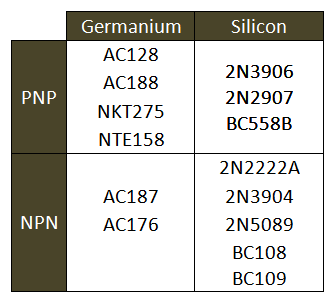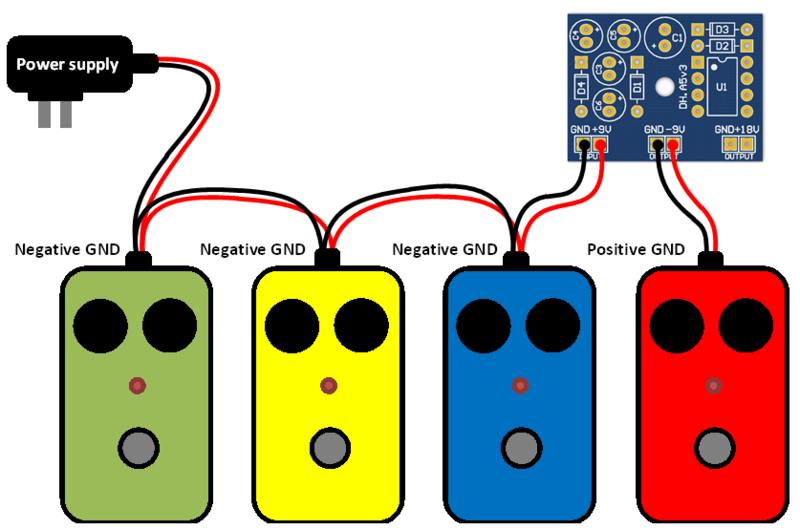Tone Bender
This is the Tonebender, one of the most iconic fuzz effects from the 60s.Steps
Categories
Status: Active
Designators and components Step 2 of 5
NEGATIVE AND POSITIVE GROUND
The PCB is designed for the original positive ground version (PNP transistors). A positive ground pedal cannot be directly connected to the power supply in chain with your other pedals (negative ground). It is necessary to use a 9V battery, an isolated power supply or a voltage inverter. If you want to build a voltage inverter, you can use the Charge Pump PCB.
If you are planning on using germanium transistors, you should build the positive ground version because most of the germanium transistors are PNP (AC128 for example). You can also compare several PNP germanium transistors or even use PNP silicon ones. However, if you are going to use only silicon transistors, you should build the NPN version... which will be more convenient to power up in chain with your other pedals.
To convert to the negative ground version (NPN transistors) is simple: change to NPN transistors, flip the polarity of the electrolytic capacitors (C2, C5 and C6) and connect the +9V where it is marked -9V.
Capacitors for PNP version Capacitors for NPN version


COMPONENT LIST
PCB
Link https://www.taydaelectronics.com/tone-bender-diy-pcb-guitar-effect.html
Capacitors
C1 10n 10NF 100V 5% POLYESTER FILM BOX TYPE CAPACITOR
C2 4.7u 4.7UF 50V ELECTROLYTIC CAPACITOR 5X11MM
C3 100n 100NF 100V 5% POLYESTER FILM BOX TYPE CAPACITOR
C4 10n 10NF 100V 5% POLYESTER FILM BOX TYPE CAPACITOR
C5 4.7u 4.7UF 50V ELECTROLYTIC CAPACITOR 5X11MM
C6 47u 47UF 50V ELECTROLYTIC CAPACITOR 6X11MM
Transistors (NPN version)
Q1 2N3904 2N3904 NPN GENERAL PURPOSE TRANSISTOR
Q2 2N3904 2N3904 NPN GENERAL PURPOSE TRANSISTOR
Q3 2N3904 2N3904 NPN GENERAL PURPOSE TRANSISTOR
Resistors
R1 100k 100K OHM 1/4W 1% METAL FILM RESISTOR
R2 10k 10K OHM 1/4W 1% METAL FILM RESISTOR
R3 100k 100K OHM 1/4W 1% METAL FILM RESISTOR
R4 470 470 OHM 1/4W 1% METAL FILM RESISTOR
R5 1M 1M OHM 1/4W 1% METAL FILM RESISTOR
Potentiometers
VOL 100k-A 100K OHM LOGARITHMIC TAPER POTENTIOMETER
FUZZ 1k-B 1K OHM LINEAR TAPER POTENTIOMETER
BIASQ2 100k 100K OHM TRIMMER POTENTIOMETER CERMET
BIASQ3 10k 10K OHM TRIMMER POTENTIOMETER CERMET
PCB


PCB CIRCUIT

TRANSISTORS
The original Tonebender employs germanium transistors (AC128). Choose the gain of each transistor as follows:
Q1: β = 70-90
Q2: β = 50-70
Q3: β = 110-130
For the PNP silicon version, you can use 2N3906. For NPN silicon version you can use 2N3904, BC108 or BC109. You can also use sockets and try different transistor combinations. Note that each transistor has different gain characteristics.
For the correct positioning of the transistors, you can use the following figures.

In the following table find some transistors you can use.


TRANSISTOR SOCKETS
It is recommended to use sockets for the transistors. You can easily use 3-pin headers (40 PIN DIP SIP IC SOCKETS ADAPTOR SOLDER TYPE).

BIASING THE CIRCUIT
You can use the trimmers to bias the circuit. By using a voltmeter, you can measure the voltage over the "Bias" pads. Set Q2 bias from 0.5 to 1.5 V, and Q3 bias: from 4.5 to 8 V. Note that if you are using germanium transistors the biasing will easily be influenced by ambient conditions such as temperature. Another method for biasing is using your ears, rotate the trimmers until you find the position you most like.

POWER SUPPLY CHAIN WITH POSITIVE GROUND PEDAL
A positive ground pedal cannot be directly connected to the power supply in chain with your other negative ground pedals. You can use the Charge Pump PCB to build a voltage inverter and power your positive ground pedal in chain with the rest of your pedals.
